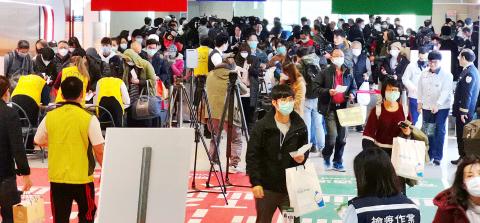While the Philippines has lifted its travel ban against Taiwanese visitors, five other countries continue to bar Taiwanese or ask them to provide medical clearance after arrival, amid the COVID-19 outbreak, International Air Transportation Association (IATA) data showed yesterday.
While Italy has banned flights by Taiwan-based airlines, it was not included in the IATA announcement, as the association looked at only passport and visa requirements.
Mauritius, Bangladesh and Mongolia, along with two of the nation’s former diplomatic allies, the Solomon Islands and Vanuatu, have imposed a variety of bans or time restrictions on travelers.

Photo:Tony Yao, Taipei Times
As of Feb. 6, Mauritius has barred entry to passengers who reside or have been in Taiwan, China, Hong Kong or Macau in the 14 days prior to their scheduled arrival.
As of Monday last week, Mongolia is not allowing travelers who live in or have been to those four places since Jan. 1 to enter the country or to transit, although the policy does not apply to people who reside in Mongolia.
Solomon Islands does not allow passengers who have visited China or transited through it in the 14 days prior to their scheduled arrival to enter the country.
While it allows entry of passengers transiting through Fiji, Kiribati, Nauru, Papua New Guinea or Vanuatu, it requires these passengers to present evidence that they have not been in or transited through Taiwan in the previous 14 days, along with 20 other nations where there have been confirmed cases of COVID-19.
Vanuatu on Monday last week announced that people who have been to Taiwan, China, Hong Kong or Macau in the 14 days prior to their arrival are not allowed to enter the country.
It is also requiring travelers who have been in any of the four since Dec. 31 last year, but who have spent the previous 14 days outside of them, to supply a copy of Medical Clearance Form 1, issued by a registered medical practitioner certifying that they are free from any respiratory illness.
Bangladesh is no longer issuing visas on arrival to Chinese nationals, as well as passengers with a Republic of China, Hong Kong or Macau passport, and passengers arriving from any of the four must fill in a health clearance form provided by their airline cabin crew.
Samoa requires passengers who have transited through or have been in Taiwan, Australia, Canada, France, Germany, South Korea, Malaysia, Vietnam, the United Arab Emirates or California to obtain a medical clearance issued by a registered medical practitioner three days before their arrival.
The Ministry of Foreign Affairs has said that Taiwanese headed for Vietnam should bring a copy of an entry-and-exit permit from the National Immigration Agency that lists their travel history in the previous 14 days to prove that they have not visited China recently.
If they are to visit other nations before arriving in Vietnam, they should make sure that the immigration officials in those countries have clearly stamped their passports, the ministry said.

NATIONAL SECURITY THREAT: An official said that Guan Guan’s comments had gone beyond the threshold of free speech, as she advocated for the destruction of the ROC China-born media influencer Guan Guan’s (關關) residency permit has been revoked for repeatedly posting pro-China content that threatens national security, the National Immigration Agency said yesterday. Guan Guan has said many controversial things in her videos posted to Douyin (抖音), including “the red flag will soon be painted all over Taiwan” and “Taiwan is an inseparable part of China,” while expressing hope for expedited “reunification.” The agency received multiple reports alleging that Guan Guan had advocated for armed reunification last year. After investigating, the agency last month issued a notice requiring her to appear and account for her actions. Guan Guan appeared as required,

A Vietnamese migrant worker yesterday won NT$12 million (US$379,627) on a Lunar New Year scratch card in Kaohsiung as part of Taiwan Lottery Co’s (台灣彩券) “NT$12 Million Grand Fortune” (1200萬大吉利) game. The man was the first top-prize winner of the new game launched on Jan. 6 to mark the Lunar New Year. Three Vietnamese migrant workers visited a Taiwan Lottery shop on Xinyue Street in Kaohsiung’s Gangshan District (崗山), a store representative said. The player bought multiple tickets and, after winning nothing, held the final lottery ticket in one hand and rubbed the store’s statue of the Maitreya Buddha’s belly with the other,

‘NATO-PLUS’: ‘Our strategic partners in the Indo-Pacific are facing increasing aggression by the Chinese Communist Party,’ US Representative Rob Wittman said The US House of Representatives on Monday released its version of the Consolidated Appropriations Act, which includes US$1.15 billion to support security cooperation with Taiwan. The omnibus act, covering US$1.2 trillion of spending, allocates US$1 billion for the Taiwan Security Cooperation Initiative, as well as US$150 million for the replacement of defense articles and reimbursement of defense services provided to Taiwan. The fund allocations were based on the US National Defense Authorization Act for fiscal 2026 that was passed by the US Congress last month and authorized up to US$1 billion to the US Defense Security Cooperation Agency in support of the

CLASSIFIED BRIEFING: The ministry said the special budget focuses on building a comprehensive defense system and strengthening the domestic defense industry The Ministry of National Defense yesterday released information on seven categories of weapons systems to be procured under a stalled NT$1.25 trillion (US$39.57 billion) special defense budget, including precision artillery, long-range missiles, air defense anti-tank missiles and more than 200,000 uncrewed aerial vehicles (UAVs). The Executive Yuan approved a draft version of the budget on Nov. 27 last year and submitted it to the legislature for review. The legislature’s Foreign Affairs and National Defense Committee yesterday invited Minister of National Defense Wellington Koo (顧立雄) to deliver a classified briefing and answer questions at a closed-door session. Koo said he hoped to provide lawmakers